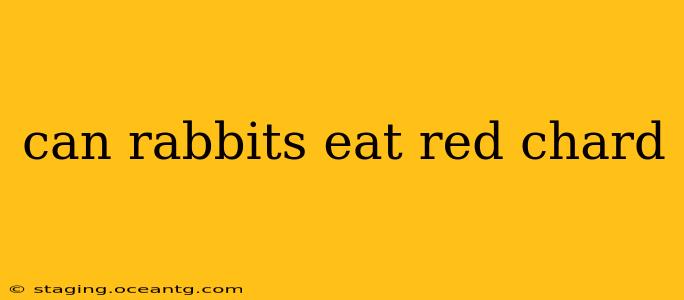Red chard, with its vibrant stalks and nutritious leaves, is a popular leafy green often found in salads and stir-fries. But is this colorful vegetable safe for our furry friends, the rabbits? The short answer is: yes, rabbits can eat red chard, but in moderation. Like any treat, it's crucial to understand how to incorporate it safely into their diet.
This comprehensive guide will explore the nutritional benefits of red chard for rabbits, address potential risks, and answer frequently asked questions surrounding this leafy green and rabbit nutrition.
What are the Nutritional Benefits of Red Chard for Rabbits?
Red chard is a rich source of essential vitamins and minerals beneficial to rabbits' health. It contains:
- Vitamin A: Crucial for maintaining healthy vision and a strong immune system.
- Vitamin K: Important for blood clotting and bone health.
- Vitamin C: A powerful antioxidant that supports overall health.
- Calcium: Essential for strong bones and teeth.
- Potassium: Helps regulate fluid balance.
- Fiber: Promotes healthy digestion and prevents digestive issues.
These nutrients contribute to a rabbit's overall well-being, supporting a healthy coat, strong bones, and a robust immune system. However, it's vital to remember that red chard shouldn't replace the core of their diet, which should consist primarily of high-quality hay.
How Much Red Chard Can a Rabbit Eat?
While red chard offers nutritional value, it shouldn't form a significant part of your rabbit's diet. Too much can lead to digestive upset. A good rule of thumb is to offer a small amount (about 1-2 leaves) as an occasional treat, no more than a couple of times a week. Always monitor your rabbit for any signs of digestive discomfort after introducing new foods.
What are the Risks of Feeding Rabbits Red Chard?
While generally safe, there are potential risks associated with feeding red chard to rabbits:
- Oxalates: Red chard contains oxalates, which can bind to calcium and potentially hinder its absorption. This is especially concerning for young, growing rabbits or those with pre-existing health conditions. Moderation is key to mitigate this risk.
- Digestive Upset: Introducing large quantities or feeding it too frequently can lead to diarrhea or gas. Start with a very small amount and observe your rabbit's reaction.
- Nitrate Accumulation: High nitrate levels in red chard can be harmful, particularly if the leaves are grown using excessive amounts of fertilizer. Choose organically grown chard whenever possible to minimize this risk.
Can I Feed My Rabbit Red Chard Daily?
No, you should not feed your rabbit red chard daily. Daily consumption can increase the risks of oxalate accumulation and digestive issues. Stick to the occasional treat approach – a few leaves a couple of times a week at most.
Is Red Chard Better Than Other Leafy Greens for Rabbits?
Red chard is a good option among many other healthy leafy greens. There's no single "best" leafy green; variety is key to ensuring your rabbit receives a balanced diet. Other safe options include romaine lettuce (in moderation), parsley, and cilantro. Always introduce new greens gradually and monitor your rabbit's response.
My Rabbit Refuses to Eat Red Chard, What Should I Do?
Some rabbits might be picky eaters. If your rabbit refuses red chard, don't force it. Offer a variety of other safe leafy greens and focus on providing plenty of high-quality hay as the cornerstone of their diet.
Conclusion: Red Chard as a Treat for Your Rabbit
Red chard can be a healthy and enjoyable treat for your rabbit, provided it's offered in moderation and as part of a balanced diet. Always prioritize high-quality hay, fresh water, and a variety of safe vegetables and greens. If you have any concerns about your rabbit's diet or health, consult with a veterinarian specializing in rabbits. Remember, responsible pet ownership includes making informed decisions about your rabbit's nutrition.
